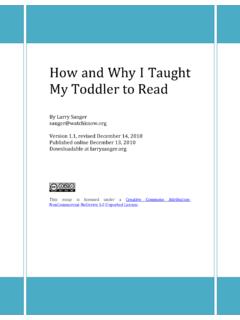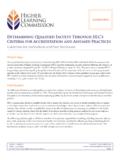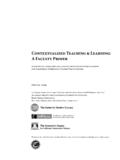Transcription of Safeguarding the Public Trust: Can Administrative Ethics ...
1 Journal of Public Affairs Education 161 Safeguarding the Public Trust: Can Administrative Ethics Be taught ?Sheila Suess KennedyIndiana University-Purdue University IndianapolisDeanna MalatestaIndiana University-Purdue University IndianapolisAbstractThe changing nature of the Public sector brings new challenges to governance and ethical decision making. A main objective of the Master s of Public Administration (MPA) program is to bring current the pedagogy of Ethics , in order to reflect the evolving nature of the sector. This article reports on one such effort that was employed in an introductory MPA course, using the approach outlined by Walton, Stearns, and Crespy in 1997.
2 It also provides details on the students evaluations of the coursework related to the Ethics module. The Ethics assignment given to students was designed to illustrate the complexity of moral reasoning that is required to maintain adherence to ethical principles, when processes lead to conflicts between deeply held value systems. Students are provided with an updated Administrative framework that builds upon our Constitutional values, and emphasizes the implications of decision making for a population that is broader and more diverse than those in the past. IntroductionTrust in government or the lack thereof has become a subject of considerable academic concern (Nye, Zelikow, & King, 1997; Catlaw, 2007).
3 As America has grown larger and more complicated, and as governments at all levels have assumed additional responsibilities, the need for Public administrators to function as ethical and trustworthy managers of our Public regulatory agencies also has grown. Whatever their political ideologies, most Americans want government to discharge its duties competently and in a manner consistent with our Constitutional values. Furthermore, even the most ardent contemporary advocate of limited government is likely to concede the utility and propriety of JPAE 16(2): 161 180162 Journal of Public Affairs EducationFood & Drug Administration (FDA) regulations on food quality, for example, in an era when few of us grow our own vegetables or slaughter our own animals.
4 Americans today must rely on government agencies to ensure that our water is drinkable, our aircraft flyable, our roads passable, and much would be difficult to overstate the importance of being able to trust our government agencies to discharge these and other, similar, functions in a competent and ethical manner. When America goes through a time where government seems inept or corrupt, as we periodically do, that confidence is shaken, and our skepticism and distrust affect more than just the political system. This is because trust in our governing institutions inevitably sets the tone for our confidence in all institutions. When we perceive that our government is not trustworthy, that perception infects the entire society (Menzel, 1997, 2006; Bowman, 1990).
5 It is easy to assert that schools of Public administration should teach aspiring Public servants to be ethical and should encourage the integration of Ethics into the curriculum, and into all aspects of program operation (NASPAA, 2009).1 Operationalizing that instruction, however, has proven to be more complicated. A recent article in the Journal of Public Affairs Education (JPAE) outlined a praxis-based, ethical decision-making process that conceptualizes the Public administrator as an agent who is prone to opportunism (Shareef, 2009). From this perspective, Ethics is the counter-force to Administrative efficiency, and a key reason for having ethical standards is to prevent moral hazard.
6 Administrative moral hazards arise when managers take inefficient actions, often because their individual interests do not align with the Public interest a form of costless, unethical behavior for the administrator that has a significant cost to taxpayers (Milgrom & Roberts, 1992). In short, according to this analysis, the ethical goal of administrators is to prevent inefficiencies. Shareef incorporates the Rawlsian (1971) notion of basic rights and a social contract between citizen and government. The idea that Public servants are obligated to provide and defend core Public values also has been developed in recent literature (Bozeman, 2002).
7 These scholars all provide useful approaches to the subject matter of Ethics , but collectively they underscore a basic challenge to Public administration. That is, for the past 30 or more years, the discipline has struggled not only with the question of how to teach Ethics , but also with the more basic, threshold question: What are Public administration Ethics ? There is reasonably broad agreement about what Administrative Ethics are not. They are not vague, feel-good exhortations about an undefined Public interest, and they are not simply the general ethical principles that typically guide personal, moral choices (Goss, 1996). Just as the legal and medical professions have codes of Ethics tailored to their professions, Public administrators have adopted ethical principles for Public stewardship.
8 We believe the approach to Ethics outlined in this article adds to the literature by focusing on new challenges that are related to the evolving nature of governance. A main premise is that the American Society for Public Safeguarding the Public trust : Can Administrative Ethics Be taught ? Journal of Public Affairs Education 163 Administration (ASPA) Code of Ethics implicitly commits Public administrators to adjust their frameworks for decision making in a way that reflects the changing nature of the Public , and by extension the Public interest. Indeed, this Code requires Public administrators to exercise discretionary authority to promote the Public interest (ASPA Code of Ethics , 2009, Section I, ), and further recognizes that the Code of Ethics is a living document (Section IV, ).
9 The Public administrator also must consider implications for a population that is broader and more diverse than those in the past. For example, today s governance features new entities and new relationships that may be subject to new conflicts of interest ones that previously had not existed ( , Kennedy & Malatesta, 2010). As a result, students should be familiar with the ASPA Code, but the utility of Ethics codes can only be realized after students learn how to recognize circumstances (old and new) that pose ethical dilemmas, and acquire a broader understanding of the approaches to ethical decision making. One way for students to grasp and prepare for the evolving challenges is to discuss events, preferably local ones, that pose ethical dilemmas.
10 It also is important for students to develop a system for considering ethical dilemmas. Thus, the Ethics assignment that is discussed in this article requires students to reflect on the broader implications that are inherent to any decision brought on by the changing nature of governance. In the next section, we discuss the broader topic of Administrative Ethics . In the remainder of this article, we report on our efforts to teach Administrative Ethics , which build on the approach outlined by Walton, Stearns, and Crespy in 1997, and then we provide details on students evaluations of the coursework, as related to the Ethics module. The Development of Administrative EthicsIn an important 1988 article in Public Administration Review, April Hejka-Ekins summarized what she referred to as the history of vacillation in the field.









